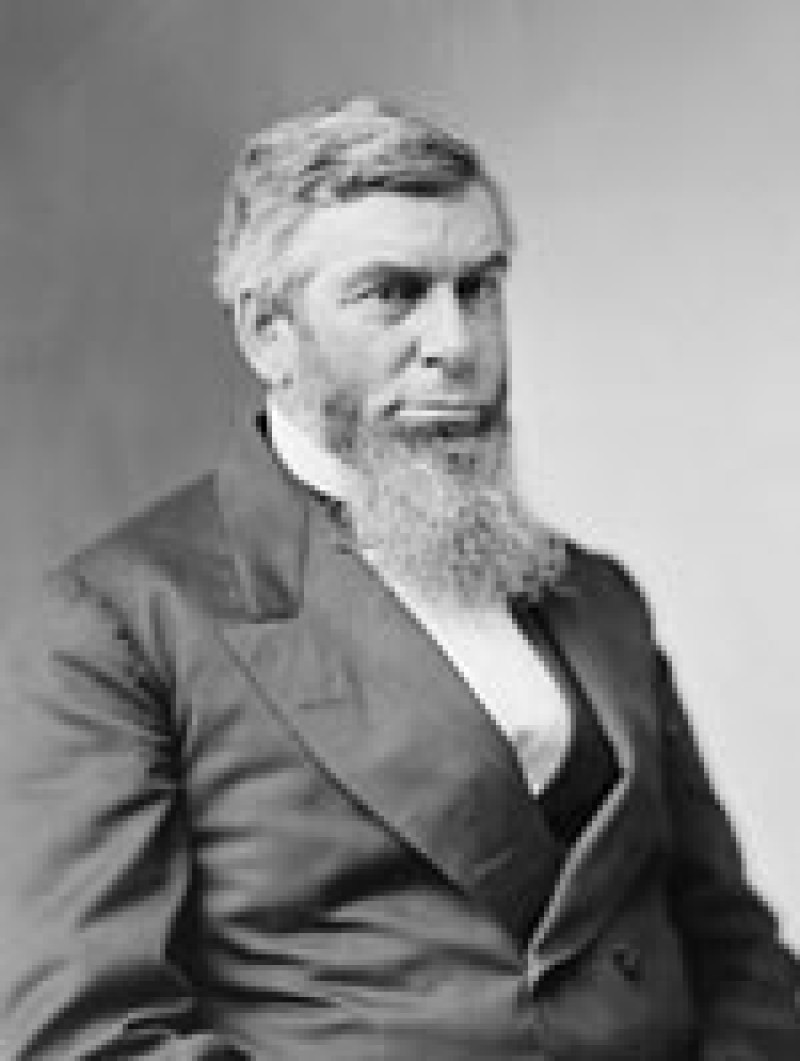Morrison Remick Waite
Despite his distinguished demeanor, Morrison Remick Waite was most often described by contemporaries as exceedingly friendly, always cheerful, a good listener, and one who had a remarkable facility for getting along with others.
Waite, chief justice of the United States, was born in Lyme, Connecticut. It was expected that young Morrison would pursue a legal career, and after attending Bacon Academy and graduating from Yale College in 1837, he studied law in his father's office. A year later he settled in Maumee City, Ohio, where he was admitted to the bar and began his practice in the office of Samuel M. Young. In 1848 Waite moved to Toledo and, in partnership with his younger brother, Richard, engaged in a successful legal business largely devoted to real estate, commercial and corporate transactions.
Prior to his appointment to the Supreme Court, Waite's public career was fairly undistinguished. He served for a short time on the Toledo City Council (1851), was a member of the state legislature for a single term (1849-1850), and ran unsuccessfully for Congress in 1846 and 1862. In 1863 he turned down an appointment to the Supreme Court of Ohio. However, in 1871 he was appointed by President Ulysses S. Grant to serve as a U.S. counsel to the international commission set up in Geneva to arbitrate claims against Great Britain for damage inflicted on northern shipping by the British-built Confederate raider Alabama during the Civil War. Upon his return from Europe Waite was elected a delegate to and president of the Ohio state constitutional convention. He still held this position when he was nominated to the Supreme Court in January 1874.
While Waite never became a significant intellectual force on the Supreme Court, his social and managerial skills, especially his good humor and sensitivity to others, helped him to maintain a remarkably harmonious and productive court.
Evidence of the court's productivity was the fact that it decided some 3,470 cases with opinions during Waite's tenure. While both the large number of cases decided and the variety of issues confronted reflected the lack of discretion the Court had at this time in hearing appeals from lower federal and state courts, it was testimony to Waite's ability to get his brethren to reach decisions and write their opinions expeditiously. It also reflected his own prodigious work habits, since about one-third of these opinions were drafted by Waite.
Waite supported broad national authority over economic activity, believing that federal commerce powers must keep pace with the progress of the country. The primary theme running through Waite's opinions dealing with economic regulation was the balance of federal and state authority.
This notion was also evident in the Waite Court's decisions dealing with the scope and meaning of the Reconstruction amendments and the rights of blacks in the south. In United States v. Cruikshank the court overturned the convictions of three men accused of massacring at least 105 blacks and three whites outside the Grant Parish, Louisiana, courthouse on Easter 1873. However, in this case the convictions were thrown out not because the statutes themselves were unconstitutional but because the indictments under which the men were charged did not specifically allege that the murders were committed on account of the victims' race. We may suspect that race was the cause of the hostility, Waite concluded, but it is not so averred.
Waite's social and political moderation was apparent in the Court's response to claims by other groups. In Minor v. Happersett (1875), using the restricted definition of national citizenship and the 14th Amendment first set forth by the court in the Slaughterhouse Cases (1873), Waite upheld the right of states to deny women the franchise. Yet Waite also sympathized with the women's rights movement and supported the admission of women to the Supreme Court bar.
Waite most certainly helped restore the prestige of the Supreme Court, which had suffered ever since that body's self-inflicted wound in its 1857 Dred Scott ruling. That he was devoted to his work on the Court is undeniable. In 1885 he suffered a breakdown, probably from overwork, but refused to retire. He was still drafting opinions and leading the Court almost literally up to the moment of his death in Washington, D.C.

